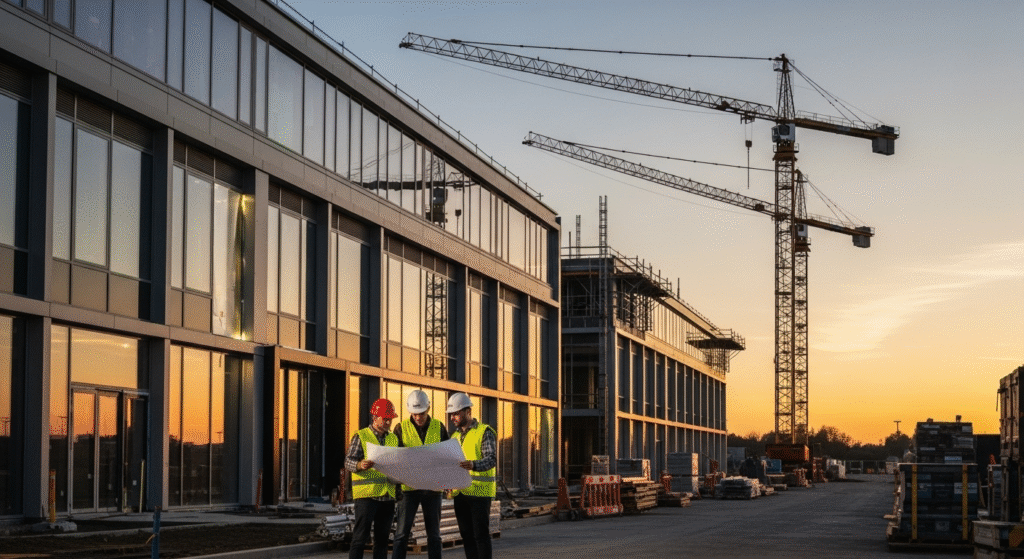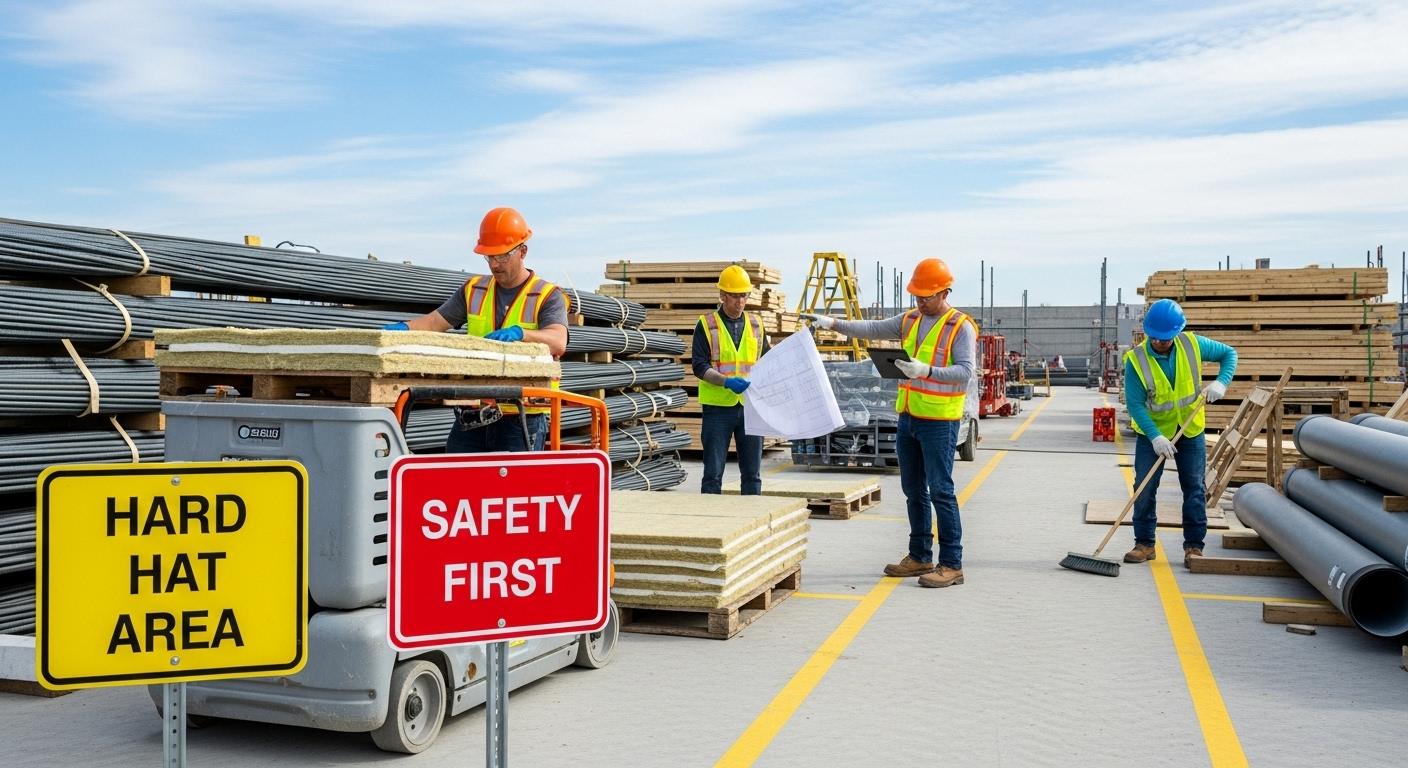Did you know that poor contractor selection can lead to budget overruns of up to 30% and project delays of months, even years? Choosing the right commercial general contractor is one of the most critical decisions you’ll make for your commercial construction project. Whether you’re planning a major renovation, a new build, or an expansion, the success of your venture hinges on the expertise, reliability, and communication skills of your chosen partner.
In this comprehensive guide, you’ll learn the seven most crucial questions to ask potential commercial general contractors to ensure you make an informed decision and secure a partner who aligns with your vision and goals. By the end, you’ll be equipped to confidently navigate the hiring process and set your project up for success.
Ready to find the perfect commercial general contractor for your next big project? Let’s dive in!
1. What is Your Experience with Projects Similar to Mine?
When evaluating a commercial general contractor, experience is paramount. However, it’s not just about the number of years they’ve been in business; it’s about the relevance of that experience to your specific project. A contractor who specializes in residential remodels might not be the best fit for a large-scale commercial office building or a specialized industrial facility.
1.1 Why Does Relevant Experience Matter?
Every commercial project comes with its unique set of challenges, regulations, and requirements. For example, constructing a restaurant involves specific health codes, kitchen ventilation systems, and customer flow considerations, while building a retail store demands attention to merchandising layouts and customer engagement areas. An experienced commercial general contractor will have a deep understanding of these nuances, allowing them to anticipate potential issues and implement efficient solutions.
- Understanding Industry-Specific Regulations: Different industries are subject to various building codes, safety regulations, and zoning laws. A contractor with relevant experience will be well-versed in these, minimizing the risk of costly delays due to non-compliance.
- Problem-Solving Skills: Projects rarely go off without a hitch. An experienced contractor has likely encountered and overcome similar obstacles in the past, giving them a repertoire of effective problem-solving strategies.
- Established Network: Contractors with a history in a particular sector often have established relationships with specialized subcontractors, suppliers, and even local authorities, which can streamline the project.
1.2 How to Evaluate a Contractor’s Experience
When a commercial general contractor discusses their experience, dig deeper than just a list of past projects. Ask probing questions:
- Specific Project Examples: Request case studies or a portfolio of projects that closely match the scope and nature of yours. For instance, if you’re planning a new medical office, ask to see their experience with healthcare facilities. Raxe Construction, for example, prides itself on a diverse portfolio, which you can explore in our Gallery.
- Roles and Responsibilities: Understand their exact role in those projects. Were they the primary commercial general contractor, or did they serve in a more limited capacity?
- Challenges Faced and Solutions Provided: Ask about any significant challenges they encountered on past projects and how they successfully resolved them. This reveals their problem-solving capabilities and resilience.
1.2.1 Case Study: Raxe Construction’s Expertise in Diverse Commercial Ventures
At Raxe Construction, we have extensive experience across a broad spectrum of commercial projects, from intricate kitchen remodeling in Berkeley, CA and Walnut Creek, CA to large-scale outdoor structural projects. For instance, we recently completed a challenging retail space build-out in Concord, CA, which required significant structural modifications and a tight deadline. Our team’s ability to coordinate multiple trades and maintain open communication with the client ensured the project was delivered on time and within budget, exceeding the client’s expectations. This is a testament to our capabilities as a leading commercial general contractor.
2. Can You Provide References and a Portfolio of Completed Projects?
Any reputable commercial general contractor should be eager to provide references from past clients and showcase a comprehensive portfolio. This isn’t just a formality; it’s a vital step in vetting their claims and understanding their track record.
2.1 The Power of References
Speaking directly with previous clients offers invaluable insights that brochures and websites can’t provide. You can learn about the contractor’s:
- Communication Style: Were they responsive? Did they keep the client informed about progress and any issues?
- Adherence to Budget and Schedule: Did the project stay within the agreed-upon budget and timeline? Were there unexpected costs or delays, and how were they handled?
- Quality of Workmanship: Was the final product up to standard? Did they address any punch list items promptly and effectively?
- Problem Resolution: How did they handle disputes or unforeseen problems? Were they collaborative and solutions-oriented?
- Professionalism: Did their team conduct themselves professionally on site?
When contacting references, ask open-ended questions and listen carefully to their responses. Look for consistency in their feedback.
2.2 What to Look for in a Portfolio
A contractor’s portfolio should be more than just a collection of pretty pictures. It should demonstrate:
- Variety of Projects: Does it show a range of project types and sizes?
- Quality and Attention to Detail: Zoom in on the details. Does the workmanship appear high-quality?
- Before-and-After Shots: These can be particularly telling, showcasing their ability to transform a space.
- Client Testimonials: While not as strong as direct references, embedded testimonials can add credibility.
2.2.1 Real-World Feedback: What Clients Say About Raxe Construction
“Raxe Construction transformed our outdated office space into a modern, functional environment that perfectly reflects our brand. Their team was professional, efficient, and incredibly communicative throughout the entire process. We highly recommend them!” – Satisfied Client, Google My Business Review
“We hired Raxe Construction for a complex retail build-out, and they exceeded all our expectations. The project was completed ahead of schedule, and the quality of work was outstanding. Their project management was top-notch.” – Business Owner, Yelp Review
“From start to finish, Raxe Construction demonstrated exceptional expertise and dedication. They handled every challenge with grace and ensured our commercial kitchen renovation was seamless. A truly reliable commercial general contractor!” – Restaurant Owner, Nextdoor Review
You can find more glowing reviews and see examples of our work on our Gallery page and our social media channels: Facebook and Instagram.
3. What is Your Approach to Project Management and Communication?
Effective project management and clear, consistent communication are the cornerstones of a successful commercial construction project. Without them, even the most skilled commercial general contractor can falter.
3.1 Understanding Their Project Management Process
Ask the contractor to detail their project management methodology. This should include:
- Key Personnel: Who will be your primary point of contact? Will there be a dedicated project manager?
- Scheduling and Milestones: How do they create and track schedules? What tools or software do they use?
- Budget Tracking: How will they keep you informed of budget adherence and any potential cost overruns?
- Subcontractor Management: How do they vet and manage their subcontractors? Do they have established relationships with reliable tradespeople?
- Quality Control: What measures do they have in place to ensure the quality of workmanship meets your expectations and industry standards?
3.1.1 The Raxe Construction Difference in Project Management
At Raxe Construction, we employ a proactive and transparent project management approach. Every project is assigned a dedicated project manager who serves as your single point of contact, ensuring streamlined communication. We utilize industry-leading project management software to track progress, manage budgets, and provide real-time updates. Our rigorous vetting process for subcontractors ensures that only the most skilled and reliable professionals work on your project. We also conduct regular site inspections and quality checks to guarantee superior results. This meticulous approach solidifies our reputation as a trusted commercial general contractor.
3.2 Communication Protocols: Keeping You in the Loop
Clear and consistent communication prevents misunderstandings and keeps the project on track. Discuss:
- Frequency of Updates: How often will you receive updates (daily, weekly, bi-weekly)?
- Communication Channels: How will they communicate (email, phone calls, in-person meetings, project management portal)?
- Reporting: What kind of reports will you receive (progress reports, budget summaries, schedule updates)?
- Handling Issues: What is their protocol for addressing unexpected issues or changes?

4. How Do You Handle Unexpected Challenges and Change Orders?
Construction projects, especially commercial ones, are dynamic. Unexpected challenges and necessary change orders are almost inevitable. The true test of a competent commercial general contractor lies in how they anticipate, manage, and resolve these situations.
4.1 Navigating Unexpected Challenges
- Proactive Problem-Solving: Does the contractor have a history of identifying potential problems early and implementing preventative measures?
- Crisis Management: How do they respond when unforeseen issues arise (e.g., material delays, unforeseen site conditions, permitting hurdles)? Do they have a clear escalation process?
- Transparency: Are they transparent about challenges, even when they are not ideal news?
- Solutions-Oriented Approach: Do they present problems with potential solutions, rather than just stating the issue?
4.2 Managing Change Orders
Change orders can be a significant source of budget overruns and project delays if not managed properly. Ask the commercial general contractor:
- Process for Change Orders: What is their formal process for initiating, documenting, pricing, and approving change orders?
- Pricing Transparency: How do they calculate the cost of a change order? Is it a clear, itemized breakdown?
- Impact on Schedule: How do they assess and communicate the impact of a change order on the project timeline?
- Client Approval: Is your explicit approval required before any change order work commences?
A well-defined change order process ensures that both parties are clear on the scope, cost, and schedule implications of any alterations to the original plan. At Raxe Construction, we adhere to a strict, transparent change order protocol to ensure fairness and clarity for our clients. Our goal is always to minimize surprises and keep your project on budget and on schedule as your trusted commercial general contractor.
5. What Are Your Insurance Coverage and Licensing Details?
This is a non-negotiable question. A legitimate and responsible commercial general contractor will have comprehensive insurance and all necessary licenses. Skipping this step can expose you to significant financial and legal risks.
5.1 Understanding Insurance Coverage
Ensure the contractor carries adequate insurance, including:
- General Liability Insurance: This protects you from claims of bodily injury or property damage that occur during the construction process. It’s crucial for any commercial general contractor.
- Workers’ Compensation Insurance: This covers medical expenses and lost wages for their employees if they are injured on your job site. Without this, you could be held liable.
- Builder’s Risk Insurance: This type of insurance covers property damage to the structure itself, materials, and equipment during construction.
- Commercial Auto Insurance: If their vehicles are used on your property, this is important.
Always ask for proof of insurance directly from their insurance provider, not just a certificate from the contractor. Verify that the policies are current and cover the full scope of your project.
5.2 Verifying Licensing and Bonding
- State and Local Licenses: Confirm that the commercial general contractor holds all required state and local licenses to operate in your area. For Raxe Construction, our California License #1119854 is readily verifiable, assuring our clients of our legitimacy and compliance.
- Bonding (Optional but Recommended): For larger commercial projects, consider a contractor who is bonded. A bond provides a financial guarantee that the contractor will complete the project according to the contract terms. There are different types of bonds, such as performance bonds (guarantees project completion) and payment bonds (guarantees subcontractors and suppliers are paid).
Verifying these details provides peace of mind and protects your investment. A reputable commercial general contractor will be transparent about their credentials.
6. How Do You Approach Budgeting and Cost Control?
Managing the budget effectively is critical for any commercial project. A reliable commercial general contractor will have a robust process for estimating costs, providing transparent pricing, and controlling expenses throughout the project lifecycle.
6.1 Initial Estimates vs. Detailed Proposals
- Accuracy of Estimates: How do they develop their initial estimates? Are they based on broad assumptions or detailed assessments?
- Detailed Proposals: Will the final proposal include a comprehensive breakdown of all costs, including materials, labor, permits, and contingencies?
- Contingency Planning: What percentage do they typically recommend for contingencies (unexpected costs)? A common range is 5-15% of the total project cost.
6.2 Cost Control Strategies
Ask the commercial general contractor about their strategies for keeping costs in check:
- Value Engineering: Do they offer value engineering suggestions to optimize costs without compromising quality or functionality?
- Material Procurement: How do they source materials? Do they have relationships with suppliers that allow for competitive pricing?
- Subcontractor Bidding: How do they manage the bidding process for subcontractors to ensure you get competitive rates?
- Tracking and Reporting: How will they track actual expenses against the budget, and how often will you receive detailed financial reports?
6.2.1 Raxe Construction’s Commitment to Budget Transparency
At Raxe Construction, we believe in complete financial transparency. Our proposals are meticulously detailed, providing a clear breakdown of every expense. We work closely with our clients to develop realistic budgets and explore value engineering options whenever possible. Our project managers provide regular, comprehensive financial reports, ensuring you are always aware of where your money is going. We strive to be the commercial general contractor who delivers exceptional value without sacrificing quality.
7. What is Your Safety Program and Site Management Philosophy?
Safety is paramount on any construction site, especially in commercial settings where large crews, heavy machinery, and complex operations are involved. A strong safety program protects workers, visitors, and your business from accidents and potential liabilities.
7.1 Comprehensive Safety Protocols
Inquire about the commercial general contractor’s safety program:
- Safety Training: Do all employees and subcontractors receive regular safety training? What topics are covered?
- Safety Officer: Is there a dedicated safety officer on site or overseeing projects?
- Personal Protective Equipment (PPE): What is their policy on mandatory PPE for all personnel on site?
- Emergency Procedures: Do they have clear emergency response plans in place for accidents, fires, or other unforeseen events?
- Regular Safety Meetings: Do they conduct regular toolbox talks or safety meetings with their crews?
7.2 Site Management and Cleanliness
A well-managed and clean job site is often an indicator of a well-organized and professional commercial general contractor. Discuss:
- Site Security: How do they secure the job site to prevent unauthorized access and theft?
- Waste Management: What is their plan for debris removal and waste disposal? Are they committed to sustainable practices?
- Site Organization: How do they maintain an organized and tidy work area?
- Minimizing Disruption: For projects in occupied commercial spaces, how do they plan to minimize disruption to your ongoing operations?

At Raxe Construction, safety is ingrained in our culture. We adhere to the highest safety standards, conduct regular safety audits, and empower our team to prioritize safety above all else. Our commitment to a safe and organized worksite ensures a smooth construction process and protects everyone involved. As your chosen commercial general contractor, we prioritize not just the completion of your project, but also the safety and well-being of all involved.
Conclusion
Choosing the right commercial general contractor is a monumental decision that directly impacts the success of your commercial project. By asking these seven essential questions, you’ll gain a deeper understanding of a contractor’s experience, capabilities, communication style, financial practices, and commitment to safety. Remember, a thorough vetting process pays dividends in the long run, saving you time, money, and stress.
Are you ready to transform your commercial space with a reliable and experienced partner? Don’t leave your investment to chance. Contact Raxe Construction today for a personalized consultation. Our team in Pittsburg, CA, is eager to discuss your project needs and demonstrate why we are the commercial general contractor you can trust.
Ready to Get Started?
Take the first step towards a successful commercial project!
- Request a Consultation: Visit our Contact Us page to schedule a meeting.
- Explore Our Services: Learn more about our comprehensive Remodeling & Renovation and Essential Home Services options.
- See Our Work: Browse our Gallery for examples of our completed commercial and residential projects.
Raxe Construction Pittsburg, CA 94565, United States contactus@raxeconstruction.com Mon-Sat: 8am-5pm (925) 232-1325 License #1119854



